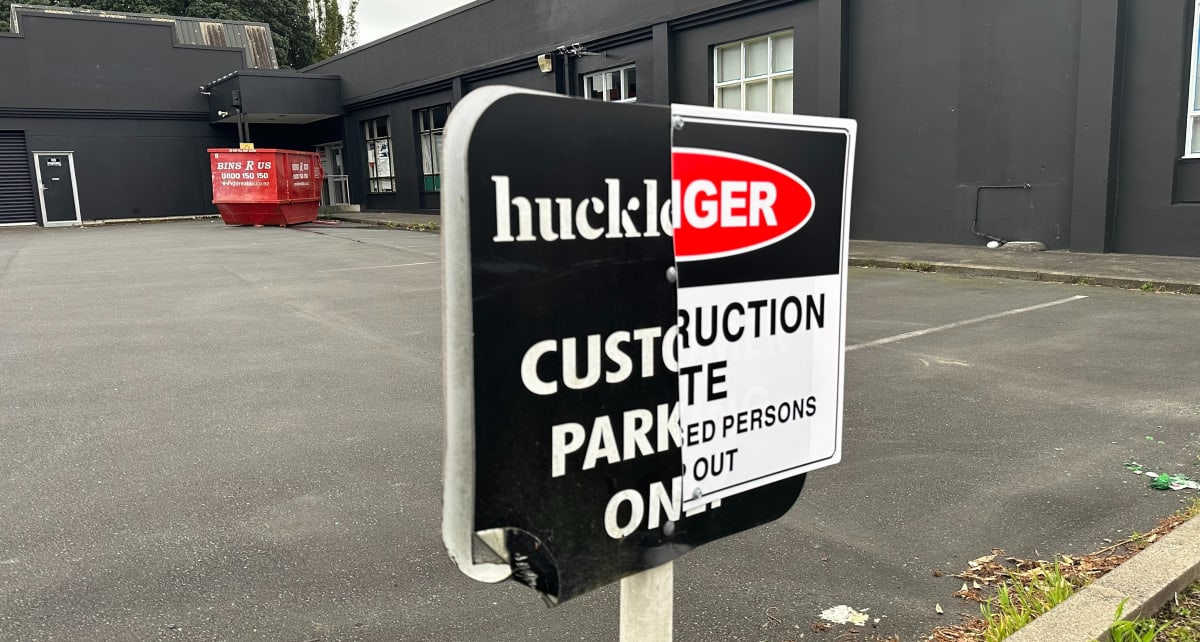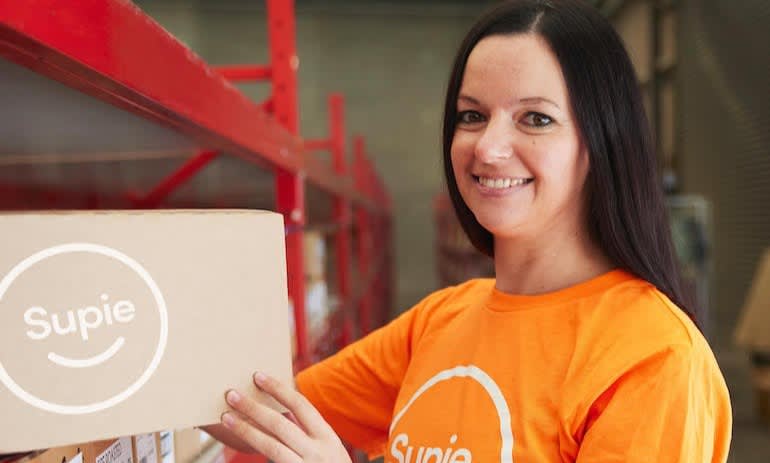
Organic grocer Huckleberry was first to sign up to a government-backed wholesale deal with the big supermarkets – but now says its expansion plans are cramped by economic and political uncertainty
Twelve months ago when Woolworths and Huckleberry announced a ground-breaking deal for the big Australian-owned supermarket chain to wholesale a range of groceries to the small organic grocer, it was with fanfare.
In response to the Commerce Commission inquiry into grocery competition and subsequent law changes, Woolworths was anxious to show it could play nicely with small challenger brands.
"We’re committed to doing that for the benefit of Kiwi consumers," said Woolworths. "It’s exactly what the industry and our customers need during this time of high inflation," said Huckleberry's Darren Guo.
READ MORE: * Calculating how much supermarket competition reform will save shoppers * Supermarkets cracking wholesale deals won't fix food prices
The Government had required the two big supermarket chains (which sometimes negotiated exclusive supply deals) to develop wholesale offerings to small grocery businesses in good faith, at competitive pricing. If they didn't play ball, authorities would step in and require them to provide wholesale supply on mandated terms.
Woolworths and Huckleberry were first movers – but that was then. What their September 2022 media release didn't disclose was that the initial wholesale deal was only for about 30 products – hardly enough to turn the price dial in a retail business like Huckleberry that sold 7000 product ranges. The wholesale prices were no cheaper, and critical brands like Woolworths' Macro Organic were excluded.
In the ensuing 12 months, the new owners of Huckleberry have closed down one of their four stores, parked a $3 million capital raise, and with the benefit of passing time, reassessed the value of the government's grocery market reforms.
The wholesale deal doesn't allow them to lower prices for consumers, says director Mat Hughes. "And the government's wholesale answer to the competition problem gives those two big players 100 percent of the buying power on the market, or very close to it. So it certainly doesn't bode well for the growers and suppliers."

The government-backed deal has given them access to a wider range of products, at more manageable volumes – for instance, they can now buy toilet paper in the quantities their customers need, rather than bulk deliveries that it would take the small retailer two years to sell.
"Certainly, it helps our customers to be able to bring a broader range of products," Hughes says. "A lot of our customers don't like the conduct of those big players, and they will pay a premium to shop somewhere like us purely out of morals and ethics."
But it doesn't allow them to expand their footprint or their market share and, critically for consumers, they don't get cheaper wholesale prices that they can pass on to consumers.
Well, colour me surprised. That's the response from Sarah Balle, the founder of online supermarket Supie, who has warned from day one that requiring Woolworths and Foodstuffs to provide wholesale goods to smaller competitors would serve only to strengthen the market dominance of the "duopoly".
This week, she tells Newsroom that major suppliers likes Mars (everything Ben's Rice to Dolmio to pet food and confectionary) and SC Johnson (cleaning and pest products like Mr Muscle and Raid) have opted out of the supermarket wholesale deals.
"If you’re small, then you won’t have a way to access these products," she says. "That means you're not able to compete – consumers will only switch to alternative retailers for their main, weekly grocery shop if you have a comparable range."

Fonterra, one of NZ’s biggest companies, also does not allow its products to be wholesaled through the supermarkets as it has its own more expensive distribution network, she says.
"That's disappointing given they should be doing what they can to help Kiwis. Helping the duopoly doesn’t count in my eyes!"
Getting into groceries
Darren Guo and Mat Hughes first connected while studying for a postgraduate Diploma in Business Administration at the University of Auckland.
They were looking for the right opportunity in groceries and found it in 2021, in the 30-year-old Huckleberry chain of stores.
"We particularly liked the space around organic groceries," Hughes says. "Wellbeing and allergy-specific products were reasonably sort of close to our hearts. I'm a coeliac so I've struggled with finding appropriate food for a very long period of time. Huckleberry has been a go-to for my family in that time."
Looking at the success of the Erewhon and Whole Foods retail chains in the USA, they felt Huckleberry had huge potential. It had started as Harvest in Grey Lynn, but Hughes acknowledges they want to move away from the early focus on Roman sandals and kaftans-wearing clientele looking to source their bulgur wheat.
"Those are really important customers to us and, as you described them, we still have exactly those customers coming in today. Without them you know the business is quite different – but we also wanted to bring a new generation of customers to the business."
Now, he says, there's a new clientele aged under 40, serious about their wellness and their health and willing to spend towards. They are also very environmentally and sustainably aligned, Hughes says.
"There's no real way that they're actually giving an opportunity to someone like us to be cost-competitive with the likes of Pak'nSave or even Countdown." – Mat Hughes
But doing their due diligence through the big Auckland lockdown, it became apparent that one of the six stores, in Browns Bay, wasn't financially sustainable. And they couldn't even visit the store in Mt Maunganui, because of the Auckland boundary imposed by the Covid lockdown.
So they took on the Grey Lynn, New Lynn, Glen Eden and Royal Oak stores. Within a year, they had to make the decision to close the Royal Oak store – which was Hughes' neighbourhood grocer. He lives just a couple of blocks away. "It wasn't without duress, particularly within our household."
It came to the end of a 10-year lease, and the trading didn't support renewing the lease another seven years.
At the time, they were looking for new sites – but now, they're putting any bricks-and-mortar expansion plans on hold. "No surprises, there are some challenges in that sector."
Dealing with the duopoly
Hughes says there are two particular challenges: the buying price, and access to suppliers. That's what they were hoping to address in their wholesale deal with Woolworths.
"The deal certainly hasn't shifted the needle for us much in the way of price, but access to products that we couldn't otherwise get, it's definitely helped in that space. I don't think it's the golden egg the Government's looking for."
The Government asked that Foodstuffs and Woolworths sell to smaller retailers at a competitive price, but doesn't mean the same price as the chains' own supermarkets. "They're never going to give us a competitive advantage over themselves. And our overheads are always going to be a higher percentage of our sales than theirs.
"For the US investors, their advisors were saying we don't think the political situation or the economy in New Zealanders is ripe for investment right now. We had some similar sorts of comments out of Asia as well."
"There's no real way that they're actually giving an opportunity to someone like us to be cost-competitive with the likes of Pak'nSave or even Countdown."
Whenever they want to order supplies from Woolworths, he says, Woolworths will go back and negotiate with each supplier. "Potentially they are beating them up on margin so that they can clip the ticket a little bit more anything they pass through."
Many ranges, like Woolworths' own Macro Organics range, are simply refused point blank. But the greater flexibility around volumes means they can sell products like Purex Eco-Friendly toilet paper cheaper than the low-volume bespoke brands they previously stocked.
Capital raise
In March this year, Huckleberry offered shoppers a 10 percent discount on groceries for life, in exchange for investing in its capital raising of up to $3 million.
The crowdfunding capital raise was offered through Equitise, aiming to raise a midpoint of $1.8 million to be able to double the store footprint, investing in its technology platform, and launching Huckleberry's own everyday and premium organic brands. These contract-manufactured brands would include pantry items, health supplements and cosmetics.
But he says uncertainty about a slowing economy and the looming election scared off international wholesale investors.
"If you're struggling to put food on the table for your family, then you just can't justify premium costs for fruit and veges."
"For the US investors, their advisers were saying we don't think the political situation or the economy in New Zealanders is ripe for investment right now. We had some similar sorts of comments out of Asia as well.
"The New Zealand economy's definitely had some headwinds. It wasn't lost on them. And whichever way it goes, an election lobbed in the middle of something creates some uncertainty."
Polling is pointing to a National-Act government, he says, which would be more attractive for overseas investors – but it's certainty they need most of all. "People will definitely want to see who wins what, what policies are put in place, what coalition is put in place, before they're willing to really make a big bet."
Cost of living
It's not just the investors who are pulling back. Consumers, too, are watching their budgets.
"The last three or four months have been pretty tough for everyone in New Zealand," Hughes says.
"You don't need to be on the breadline to be feeling the rising cost of living, and we're at the premium end of the market. If you're struggling to put food on the table for your family, then you just can't justify premium costs for fruit and veges."
But there is light on the horizon – an opportunity to again expand significantly beyond Auckland. Huckleberry is in talks with a group of iwi, keen to bring a Huckleberry-related product into their part of the motu.
"A significant percentage of those five million people are really struggling to get access to good quality food at the moment. That's not acceptable. I don't care what side of the political spectrum you're on, it's just an unacceptable position for us to be in as a country."
"We just think what an incredible story it would be, if iwi-led initiatives actually made a fundamental difference in shifting the dial of access to kai, for all New Zealanders but certainly people with various iwi across the country."
He says they've been talking about kai sovereignty: putting ownership, control and access to really good quality food back in the hands of the people.
There are five million New Zealanders, Hughes says, producing enough food to feed 50 million people around the world.
"A significant percentage of those five million people are really struggling to get access to good quality food at the moment. That's not acceptable. I don't care what side of the political spectrum you're on, it's just an unacceptable position for us to be in as a country.
"It would be a great leadership opportunity for iwi to really show the Government how it should be done, to be honest."







